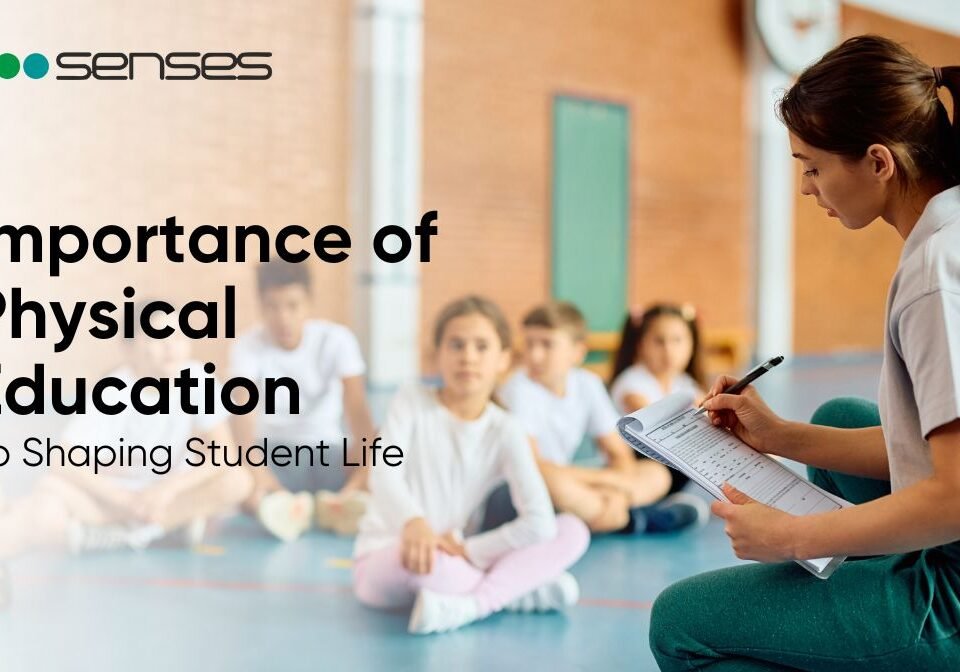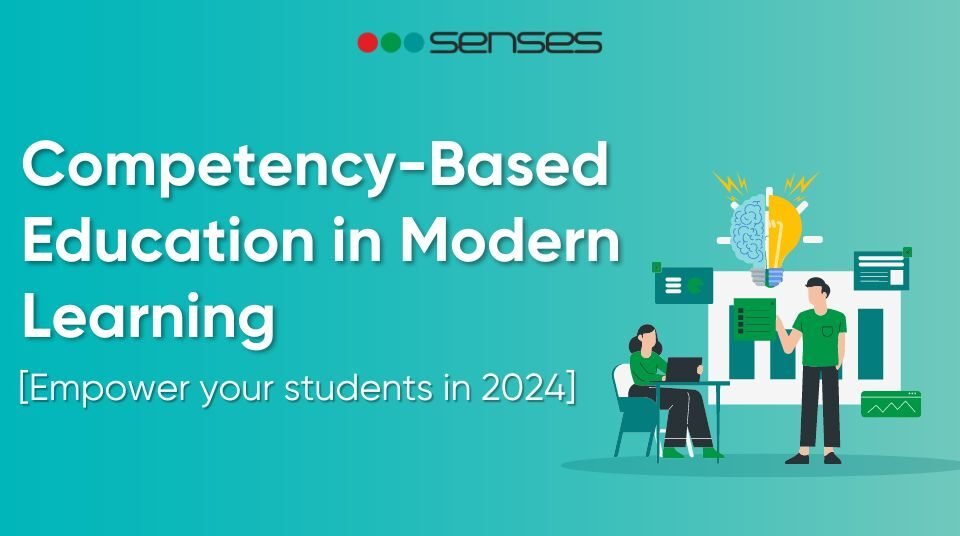A Comprehensive List of CCA Activities in CBSE School 2024-25
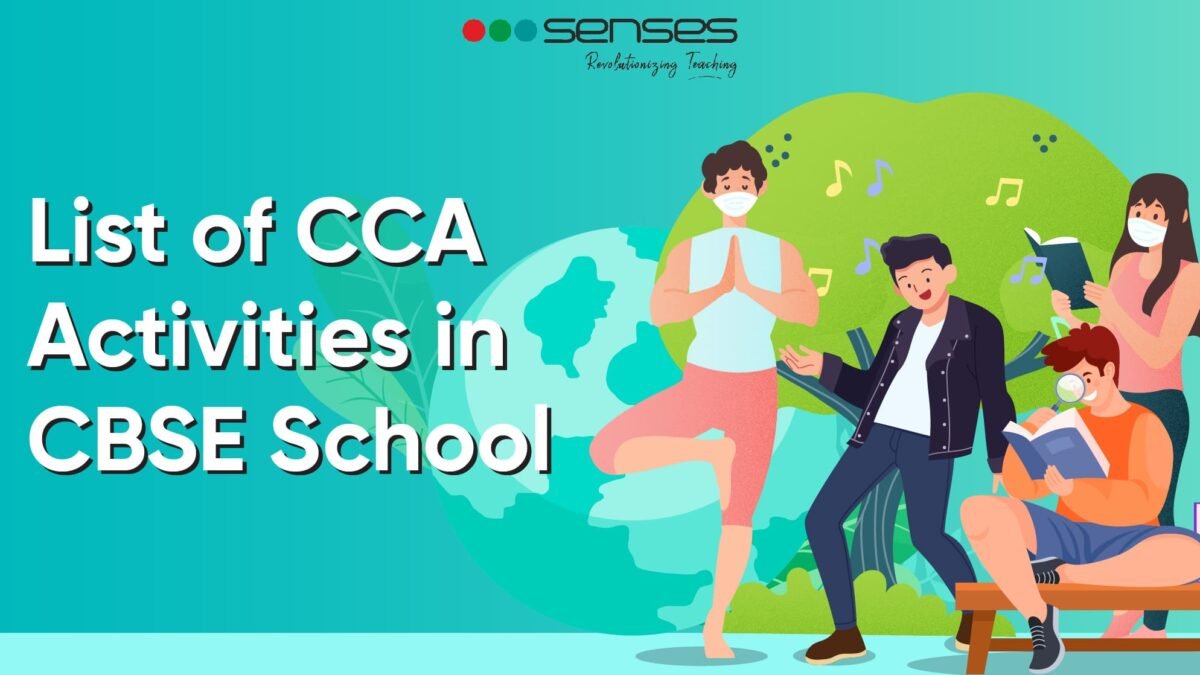
Co-Curricular Activities (CAA) are a significant part of CBSE schools as they help students develop a 360-degree approach to learning. The co-curricular activities allow the children to participate in activities not part of the curriculum but supplement the classroom activities. These activities boost confidence in students, make them execute multiple tasks, equip them with leadership qualities and time management skills, and encourage them to discover their hidden talents.
Teachers, school in-charges, and CCA coordinators are required to leverage co-curricular activities to ensure the students’ cognitive growth. But what activities help the students? Don’t worry—we have listed the top CCA activities of CBSE (Central Board of Secondary Education) schools. We have also shared a class-wise list of CCA Activities that CBSE Schools follow.
Let’s check the co-curricular activities list together. But first, let’s briefly understand the difference between co-curricular and extracurricular activities.
Difference Between Co-Curricular and Extracurricular Activities
Most often, Co-curricular and extracurricular activities are used interchangeably. However, there are some differences between them.
Co-curricular activities reinforce the classroom curriculum; however, extracurricular activities refer to activities that occur outside the classroom and don’t supplement the academic curriculum. Extracurricular activities are often not associated with schools.
For example, students can take music classes after school hours, join debate clubs, or join sports clubs.
List of CCA Activities in CBSE School
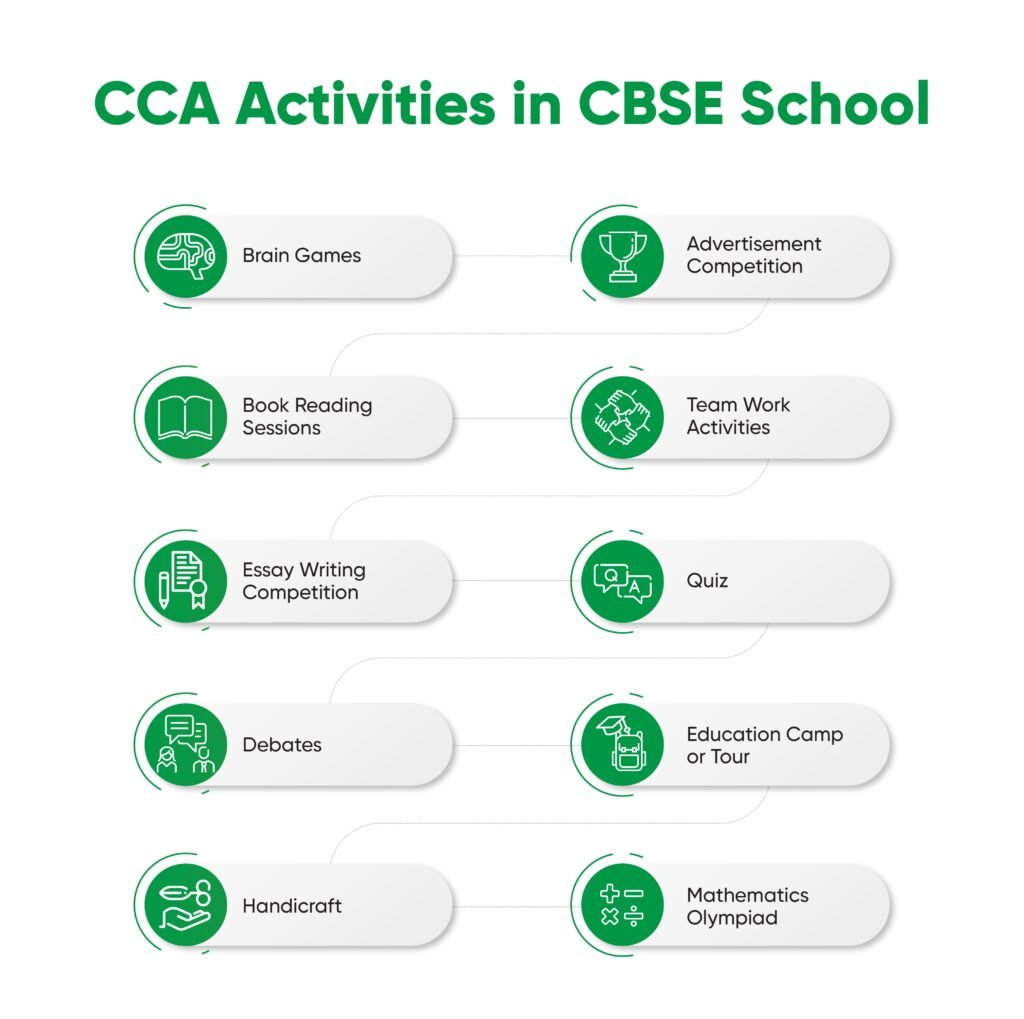
1. Brain Games
One of the major activities on the list of CBSE CCA activities is brain games. The games help improve attention levels, memories, response time, and building skills, and train it to make quick and thoughtful decisions. There are various brain activities and games schools conduct for students.
- Sudoku
- Puzzle
- Brain Teaser
- Maze
You can also find brain games apps for your students and customise the traditional games into brain games according to your subject and goal. Students enjoy playing games and subconsciously learn the concept.
2. Book Reading Sessions
Reading is an essential skill students need to learn. Reading sessions help students improve focus, gain valuable knowledge, develop the ability to emphasise words, and increase their vocabulary. Conducting one-on-one reading sessions in front of the classroom also helps teachers enhance the students’ public speaking skills.
Instead of classroom books, teachers can also conduct newspaper reading sessions.
3. Essay Writing Competition
Expressing viewpoints is a skill that needs to be nurtured from childhood. Schools understand this and conduct essay writing competitions. Essay writing competitions help teachers foster essential skills like research, critical thinking, and creativity in the students. Essay writing practice helps the students write their answers well in exams, Statements of Purpose, job emails, and more in the near future.
4. Debates
Debates encourage students to develop skills that support a point of view, quickly generate intelligent responses, listen to the other parties, present information concisely, and develop problem-solving, innovative, and critical thinking skills. Conducting debates is part of various CBSE schools’ CCA across the country. The discussion can be casual or competitive, like inter-school debate competitions.

5. Handicraft
Making handicrafts engages students in activities and allows them to gain a deeper understanding of innovating or creating something. In handicraft activities, students can unleash their creativity, develop science project models, textiles for their lifestyle class, replicas of historical monuments, etc. Other than these, students can also make:
- Paper Origami
- Paintings
- Handmade Purse/bags
- Rakhi/batches
- Baskets
- Wall decoration artefacts
6. Advertisement Competition
The marketing and business world is booming. Students witness daily advertising that sometimes evokes the desire to buy the product or only creates awareness about its existence. Advertisement competition allows students to learn the core business by applying their creativity and understanding. For advertisement competitions, students can create
- Social media advertising copies
- Print media advertisement
- Video advertising
- Advertisement jingles/raps/songs
7. Team Work Activities
Along with competition and solo activities, CBSE schools allow students to engage in team activities. Team activities equip the students with leadership skills, management skills, collaboration skills, problem-solving, creativity and more. Teamwork activities to conduct in schools include:
- Classroom Decoration
- Event Planning
- Team game
8. Quiz
Quizzes are the most popular co-curricular activity in schools. The quizzes with different levels are suitable for each classroom. Quiz competition helps the learner revise their learning. The quiz also allows teachers to assess students’ knowledge and skills.
9. Education Camp or Tour
The CBSE school’s CCA list also includes education camps and tours for senior students. Students can take them to any historical place, science museum, other school, or NGO to help them experience real-life challenges. In education camp, students have fun, learn, collaborate, and build team management and social and leadership skills.
10. Mathematics Olympiad
A mathematics olympiad helps you identify exceptionally good students of your school in that particular subject. By conducting the olympiad, you can make the students prepare for it, go through the entire syllabus, and give their best. The olympiad may offer students different benefits like building confidence, opening up new opportunities, scholarship grants, etc. Schools can also organise or participate in science olympiad, English olympiad, commerce olympiad etc.
Other than these, co-curricular activities may include internships, volunteer work, campus organisation, sports in school, research, doodle art, interior designing etc.
Class Wise List of Co-Curricular Activities in CBSE School
| Class XI to XII | Class VI, VII, VIII | Class I – VIII | Upper KG | Nursery to Lower KG |
| Magazine Cover Design Competition | Debate | Public Speaking | Fancy Dress | Fancy Dress |
| News Reading | Poetry Recitation | Poetry Recitation | Rakhi Making/Card Making | Painting/Drawing |
| Poster Designing | Collage Making | Collage Making | Dance/Music | Dancing/Singing |
| Education Camp | Book Mark Making | Book Mark Making | Diya Decoration | Clay Modelling |
| Slogan Writing | Creative Writing/Digital Painting | Creative Writing | Doll/Mask/cap Making | Handwriting Activity |
| Debate | Cooking | Rakhi Making/Rangoli Making | Drawing/painting | Dramatisation of fairy tales/stories |
| Volunteering | Handicraft | Spelling Bee | Best Out of waste | Making them see picture to memorise name of national leaders/known personality |
| Event Planning | Volunteering | Volunteering | Newspaper Activity | Rakhi Making/Paper Crafting |
Reference: Delhi Public School, Durgapur and PM Shri Kendriya Vidyalaya, RamaKrishna Puram, Delhi.

How to Balance Academics with Co-Curricular Activities?
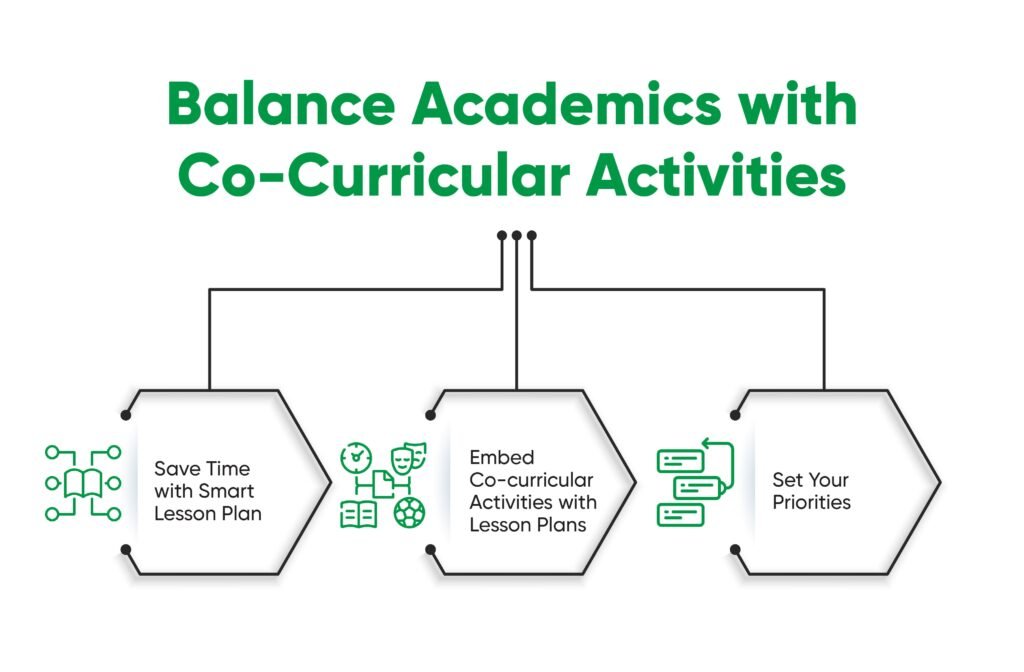
It’s true that co-curricular activities offer great exposure to students, and teachers need to support and organise them regularly. But balancing academics with co-curricular activities becomes challenging.
Here are some tips a teacher or school can follow to balance academics and activities.
1. Save Time with Smart Lesson Plan
Lesson planning takes lots of time. In the traditional classroom model, you might be required to write and erase, draw images, shapes in the classroom multiple times to make students understand. Howerever, by leveraging some digital tools and equipment you can plan your lessons efficiently. Schools may consider replacing traditional black or white boards with intelligent panels, on which you can easily plan your lessons using ready to use models, videos, images, text and more. The new approach will ease your task, save time and help students understand the same easily.
2. Embed Co-curricular Activities with Lesson Plans
Some activities like quizzes, debates, online games can be embedded with the lesson plans. You can prepare quizzes for revision from the classes you took last or second last week. You may also ask students to prepare for debate about topics you’ve already taught. It will help you evaluate your students and will support them to perform in co-curricular activities conveniently. This will eliminate the requirement of separate classes like revision or doubt solving. Moreover, you can also take help of smart panels to access online brain games, subject wise quizzes, assessments to plan the co curricular activities in the classroom.
Want to learn about Smart Panels in Detail? Schedule a Personalized Demo at Your Place
3. Set Your Priorities
One of the most important things to balance the different activities is knowing what should be prioritised and when. For example If exams are coming, you’re responsible towards making your students revise the concept. At that time, you probably encourage your students to engage in such co-curricular activities that will support them in scoring well for example chapterwise quizzes, essay writing on certain topics about to come in exams, speaking bee helping the students correctly etc.
Senses Panel is Always There to Support Your Teaching Method!
Whether you want to engage your students in co-curricular activities or make your classroom interactive with virtual experiments, simulations, videos or images, the intelligent Senses panel will help you in every activity. The panel has plenty of features, including:
- AI tools for translations, text-to-speech, content generation
- Write-erase, multi-canvas, split canvas features
- Text and shape recognition
- Insert files like images, videos, pdfs, ppts and others
- Subject and class-wise 3-D models and images
Senses intelligent panel also provides 24/7 support to help with any technical issues. With us, you can also book multiple training sessions for your teachers at no cost for up to 3 years.
Want to learn about the Senses Panel in detail? Let’s schedule a personalised demo.
Alternatively, You can also watch the video:
FAQs Related to the List of Co-Curricular Activities
Some examples of co-curricular activities are:
Magazine Cover Design Competition
Debate
Public Speaking
News Reading
Poetry Recitation
Poetry Recitation
Poster Designing
Collage Making
You can plan co-curricular activities in school by following 5 steps.
Understand your student’s interests and needs.
Decide the end goal to be achieved with the activities.
Craft the challenges, benefits, and ideas to execute.
Decide which types of activities to conduct.
Plan it with the co-curricular activities coordinator, colleagues, and other stakeholders.
For detailed information about organizing the co-curricular activities, refer to the ebook by e-Gyan Kosh.
Spell bee, new paper reading, debate, and handicrafts making are some of the activities of CBSE CCA.


